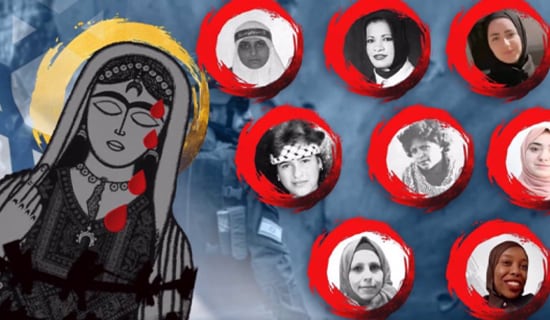Like every year during the month of Ramadan, Arab television stations have been airing new drama series that are avidly watched throughout the Arab world.[1] Two of these series, both of them dealing with the terrorist organization ISIS, sparked controversy in Egypt, especially the series Bi-Tulou' Al-Rouh,[2] about a woman whose husband forces her to join ISIS with him and who tries in vain to escape. This series sparked outrage already in March, before it began airing, after a poster for it was circulated, showing the characters in ISIS garb. Some, including Egyptian clerics, objected to the series on the grounds that it associates Islam with terrorism. For example, Al-Azhar scholar 'Abdullah Rushdy tweeted: "Arthouse [television series] that present religious people as terrorists will not manage to combat terrorism as much as they have managed to disgust viewers who fear harm to their religion. Can't you present the veil and the beard in their pure form, as they are worn by most of the Muslims in the world?!'[3] Egyptian preacher Muhammad Al-Sawi tweeted against the creators of the series: "Don’t these artists have any other issue [to deal with] excerpt terror, beards and veils? Has it escape your notice that America killed one million Vietnamese? Is there no series about Israel and its terrorism?...”[4] Much of the criticism was directed at actresses Elham Shahin and Menna Shalaby, who play the leading women characters in the series, especially at the former, who wears a headband bearing the shahada (the Islamic proclamation of faith), which many regarded as an insult to Islam.
In response to the criticism, the series writer, Muhammad Hisham 'Obeya, stressed that discussing ISIS does not constitute an insult to Islam, saying: "ISIS is a multinational extremist organization. Does anyone want to support it?... We, [the series] creators, decided to take a stance against it. The series does not insult Islam in any way. Art is incapable of harming religion." He added: "The series explores the reasons for the rise of ISIS and for its success in the Arab countries, in an attempt to understand the characteristics of this organization, which can be called all kinds of things, but not Islamic."[5] Actress Elham Shahin, who plays a commander of ISIS woman fighters in the series, expressed puzzlement about the public's reaction to it. Speaking on an Egyptian television program, she said that the public is apparently afraid to face the facts, and added: "The part [I play] in the series reveals the true face of the ISIS operatives; when you watch it you will understand. These people [i.e., ISIS] take you very far away from religion."[6]

Posters for the series Bi-Tulou' Al-Rouh (Source: Aljazeera.net, March 13, 2022, Cairo24.com, March 23, 2022)
The other series that sparked controversy in Egypt was The Returnees, directed by Ahmad Jallal. Based on true stories, it deals with young Egyptians who returned to their homeland after joining ISIS and with the efforts of the security forces to capture them before they carry out attacks.[7] One scene in the series shows a young ISIS member who murders his father. Among the claims made against the series was that it is not realistic.
Following the criticism against the two shows and the attacks on some of the actors who appear in them, Egyptian journalists came to the defense of the shows, and rejected the claim that they associate Islam, or Arab societies, with ISIS. They called on those who criticize them to condemn ISIS instead of television dramas that deal with it. One journalist also questioned the claim that ISIS has nothing to do with Islam, and asked why, if this is the case, the Sheikh of Al-Azhar, Ahmad Al-Tayeb, refused to proclaim that ISIS is heretical.[8] Another journalist decried the infringement on freedom of artistic expression.
The following are translated excerpts from some of these articles.
Egyptian Journalist Tawfik Hamid: Those Criticizing The Series About ISIS Should Be Criticizing The Organization Instead
In an article on the Radiosawa.com website, Egyptian thinker Tawfik Hamid, who in his youth was a member of the Islamist Gama'a Al-Islamiya organization and today lectures in the West against fundamentalist Islam, came out against those who criticized the series Bi-Tulou’ Al-Rouh for associating Islam with terrorism. He asked why the critics did not condemn ISIS itself in real time, and why the Sheikh of Al-Azhar refused to proclaim ISIS heretical. He wrote: "Several weeks before the marathon of Ramadan television series began, many people on social media [started] circulating posters for some of the dramas that were scheduled to air during this honorable month, including the series Bi-Tulou’'Al-Rouh. Actress Elham Shahin [who stars in the series] was brutally criticized, [because] some considered the series an affront to Islam.
"One of the main reasons for the controversy was that the series heroines, [played by] Elham Shahin and Menna Shalaby, wear the black clothes typical of the 'mujahidat' [women fighters] of the Islamic State organization, known as ISIS. The attack on Elham Shahin was more severe because she also wore a scarf bearing the shahada [the Islamic declaration of faith] proclaiming the oneness of God [i.e., the verse 'There is no god but Allah and Muhammad is His Messenger], and some saw this as a grave insult to Islam.
"The strange thing is that those who are attacking Elham Shahin for wearing this costume never attacked the ISIS operatives who dressed the same way! They have no problem when the declaration of faith, 'there is no god but Allah,' appears on the garment of a terrorist, but they are furious when a respected actress like Elham Shahin wears it. As Shahin herself said about the affair, these people are 'afraid of the facts'… She appeared on 'Amr Adeeb's show and said explicitly: 'The part [I play] in the series reveals the true face of the ISIS operatives; when you watch it you will understand. These people take you very far away from religion.'
"Let me add in this context that, if the people who are attacking the actress Elham Shahin had really been opposed to associating the shahada with terrorists' clothes, we would have heard them voice this opposition when the terrorists were carrying out suicide attacks and murdering innocent women, children, elders and widows. But they kept silent and did not utter a sound!... The murders did not shock them, and they only took umbrage when Elham Shahin wore the official costume of an ISIS operative!...
"If these clothes do not represent Islam, then why did the current Sheikh of Al-Azhar, Ahmed Al-Tayeb, refuse to state explicitly that the ISIS criminals are not Muslim? Furthermore, is it not more reasonable to condemn the actions of ISIS [itself], which stoned people [to death], committed massacres, enslaved women and set up slave markets to sell kidnapped or captive women, than to condemn the costume worn by Elham Shahin? Was it not the criminal members of ISIS who associated Islam with evil, cruelty and barbarity by committing their terrible crimes? Did we not see the ISIS cowards read the Quran before mercilessly blowing up civilians? Is this also the fault of Elham Shahin?...
"Those who attacked the series included many sheikhs and preachers. Prominent among them were [Al-Azhar scholar] 'Abdullah Rushdy, who tweeted: 'Those arthouse [television series] that present religious people as terrorists will not manage to combat terrorism as much as they managed to disgust viewers who fear harm to their religion. Can't you present the veil and the beard in their pure form, as they are worn by most of the Muslims in the world?!'
"I say to 'Abdullah Rushdy in this context: What pure image of Islam have you ever provided people? Your claim that it is permissible to have sexual intercourse with women war prisoners because 'they have needs' – is that the pure image [of Islam] you want to present to the viewers?...[9]
"Moreover, some called to boycott the companies whose commercials were aired during the show, under the slogan 'I don't buy products that promote a series that distorts Islam.' It seems that these people consider the conduct of ISIS as the true form of Islam, and will not have anyone criticizing it.
"I thank Ms. Elham Shahin and all the creators of this series, which has taught the Salafis a lesson they will never forget, namely that crimes committed in the name of Islam will not remain without anyone being held to account for them! The time of reckoning has come."[10]

Tawfiq Hamid (Source: Radiosawa.com)
Media Figure Hamdi Rizq: The Outrage Over The Series Indicates That ISIS Ideology Still Exists Among Us
Egyptian media figure Hamdi Rizq, formerly the editor of Al-Masri Al-Yawm and today a columnist for this daily, wrote that the criticism directed at Elham Shahin suggests that ISIS ideology has penetrated into Egyptian society. He wrote: "The image of actress Elham Shahin in ISIS uniform and wearing a black headband in [the poster for] the series Bi-Tulou' Al-Rouh brought out the ISIS ideology that is still lurking in some destroyed minds. How can a poster showing Elham Shahin dressed as an ISIS [operative] prompt ordinary people to attack this great actress, who was hounded with curses, invective and accusations of immodesty and heresy [by people who] did not really look closely at the picture and figure out what it is about[?]
"What does Islam, which you are defending, have to do with ISIS?!... Islam has nothing to do with the black flags of ISIS and nothing to do with murder, bloodshed or the enslavement and selling of women as slaves in black markets.
"Strange! When did ISIS perpetrate your minds, and when did you develop a fondness for its flags[?] It make you angry to see the ISIS flag or the black headband on the forehead of an ISIS operative in the series, [played by] Elham Shahin? Do you not see this [uniform]… in northern Iraq? How puzzling! Who is offended by a series that exposes ISIS' crimes, its men and women [operatives], their manner of dress, their ideas and their plans?...
"Is ISIS living nearby, and are its members living among us[?] Is ISIS hiding like a snake under our floor and taking over our minds and thoughts?! Who are these people who are defending ISIS in Egypt?!..."[11]
Egyptian Journalist Marlin Saloum: Freedom Of Creation Should Be Allowed, And Terrorist Ideology Must Be Exposed
In an article in the Emirati daily Al-Khalij, Egyptian-Lebanese journalist Marlin Saloum slammed the critics of the series Bi-Tulou' Al-Rouh for opposing it without even watching it, and stressed that she was not defending the series but rather freedom of creation and all works of art that expose terrorist thinking. She wrote: "The proverb that 'the title reflects the content of the book' is not true for all books. Some titles are captivating and intriguing but the text behind them is completely different and not worth reading. Conversely, some titles seem pale while the text is rich and impressive. This is true for everything, for every work of art and for any position we condemn at a glance, based on its title or superficial [characteristics], without taking a minute to understand its essence.
"This is what is happening right now with the series Bi-Tulou' Al-Rouh, which has evoked fierce attacks on social media since its advertising campaign was launched… Who is behind the campaign against the series and the demand to ban it even before we have seen even a single episode?... No drama should be judged based [solely] on an ad, an image, a title or a single scene from it. Why be so quick [to judge]?
"I am not defending the series, because I will wait to watch it [before] judging it. I am only defending freedom of creation and free speech, and all those who aspire to create works with an ideological goals, which present reality and expose facts – especially works that expose terrorist thinking, its evil nature and the way it injects its poison into people's minds and attempts to spread within societies and sow terror and destruction in every peaceful country."[12]
Egyptian Journalist Khaled Montasser: The Scene In The Returnees Where An ISIS Operative Murders His Father Is Totally Realistic
In an April 4 article in the daily Al-Watan, liberal Egyptian journalist and physician Khaled Montasser referred to a scene in the series The Returnees in which an ISIS operative kills his own father. Responding to comments by viewers who claimed the scene was unrealistic, he presented examples of real ISIS members who killed their parents. He wrote: "Viewers who watch the series The Returnees were surprised to see a scene in which an ISIS member, Nizar, shoots his father to death in the middle of the [city] square in front of a crowd that keeps shouting 'Allah akbar'… The son does this with a clear conscience, because the organization commander proclaimed the father to be an apostate. The surprising point [in the plot] is that the one who recorded the father's opposition to ISIS and informed on him was his young son, Nizar's brother. The [series presents ISIS'] brainwashing and distortion of perception as so profound that viewers refused to believe it, and claimed that it is exaggerated and that such crimes exist only in the imagination of the series creators. So here are some [incidents] that really took place, as described by Salah Al-Din Hassan… in a study he published that was cited in the news and in the papers,[13] which are much more grave and terrifying than what happens in the series:
"'Hassan,' aged 16, walked into [the bedroom of] his father, Farouq Al-Jabouri, who was a prominent parliamentary candidate on behalf of the National Coalition party in the [2018] elections to the Iraqi parliament, and shot him to death while he was sleeping. In early 2016, ISIS announced that one of its operatives had killed his own father in the execution square on charges of apostasy, before detonating himself in a suicide operation against Jabhat Al-Nusra commanders. Many ISIS operatives tweeted their support for his action and justified it based on the so-called principle of al-wala wal-bara…[14] According to the Syrian Human Rights Observatory, an ISIS operative in his 20s called 'Ali Saqr executed his mother, Lina Al-Qassem, in public. He informed his commanders that she had 'incited him to leave ISIS and flee with her from Al-Raqqah [ISIS' stronghold in Syria],' and had warned him that the attacks of the international coalition [against ISIS] would kill all the operatives. The organization immediately arrested her and accused her of apostasy, and her own son [then] shot her in front of hundreds of people.
"In 2015 a Saudi reported that his son, Muhammad Al-Ghamidi, had espoused a takfiri ideology [i.e., an extremist Islamist ideology that accuses other Muslims of heresy] and joined the [ISIS] organization. [The father then] led the security forces to [his son] so they would arrest him, but the son shot the father, crying out 'Allah akbar'… Two Saudi brothers who joined ISIS, Sa'ad and 'Abd Al-'Aziz Radi 'Ayyash Al-'Inzi, were accused of killing their cousin. One of them butchered [the cousin] for serving in the Saudi armed forces, while the other filmed the crime. The family was astonished, since all three had grown up together in the same house! That year, a pair of twins in Riyad who had pledged allegiance to ISIS stabbed their parents and their younger sister. In April 2014 an ISIS official in Kirkuk in northern Iraq shot his father to death. According to an Iraqi security source, the son fired about 30 bullets at his father, and the investigation indicated that the murder was part of a struggle between the Ansar Al-Sunna and ISIS organizations, and that the father had refused to pledge allegiance to the ISIS commander.
"Do you still doubt that the brainwashing carried out by the religious organizations is one the greatest dangers, which erodes, distorts and kills [people's] conscience and rationality?"[15]
[1] On Ramadan series of previous years, see MEMRI Special Dispatch No. 8731 – Gulf-Based Writers: Ramadan TV Programming Focusing On Jews Of Arab Countries Courageously Reflect Topics Silenced For Years, Attesting To Shifts In Arab Society, May 4, 2020; Inquiry & Analysis Series No. 1176 - 'Selfie' – Satirical Saudi TV Show Sends Shockwaves Through The Kingdom – July 16, 2015.
[2] The series is directed by Kamla Abou Zekry and was filmed in Turkey, Lebanon and Syria. The phrase bi-tulou' al-rouh literally means "with the soul leaving (the body)" and is also an idiom meaning "with great effort." In this context it refers to the fact that the heroine, whose name is Rouh ('soul, life'), managed only with great effort to flee ISIS and save her life and her soul.
[3] Twitter.com/abdullahrushdy, March 8, 2022.
[4] Twitter.com/ElsawyTV, March 8, 2022.
[5] Aljazeera.net, March 13, 2022.
[6] Aljazeera.net, March 13, 2022.
[7] Al-Yawm Al-Sabi' (Egypt), March 17, 2022.
[8] See MEMRI Special Dispatch No. 5910 - Al-Azhar: The Islamic State (ISIS) Is A Terrorist Organization, But It Must Not Be Accused Of Heresy – December 21, 2014.
[9] In 2019, Rushdy tweeted that women prisoners of war also have needs, and that there is no shame or sin in it if they agree to sex with their captors. His tweet sparked outrage and accusations that he was permitting rape. Twitter.com/abdullahrushdy, August 31, 2019, September 10, 2019.
[10] Radiosawa.com, March 18, 2022.
[11] Al-Masri Al-Yawm (Egypt), March 19, 2022.
[12] Al-Khalij (UAE), March 18, 2022.
[13] See e.g., Hafryat.com, May 15, 2018.
[14] The principle of loyalty to Muslims and renunciation of non-Muslims, which is endorsed as a central principle by many extremist Islamic movements. These movements regard even Muslims who differ from them in their beliefs as infidels who must be shunned.
[15] Al-Watan (Egypt), April 4, 2022.




